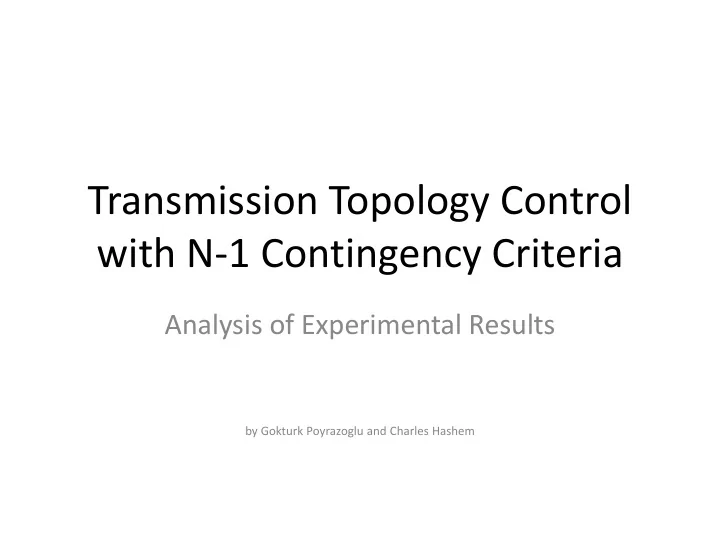

Transmission Topology Control with N-1 Contingency Criteria Analysis of Experimental Results by Gokturk Poyrazoglu and Charles Hashem
Transmission Topology Control in OPF • Method: – Consider transmission network as a variable, not a parameter – By changing the network, operating state of the system will change (voltages, generation) • Results: – Slight difference on the voltage and generation may prevent congestion on the lines – This may lead smooth LMP variance rather than large jumps on the affected busses – The operating cost of the system will reduce
N-1 Contingency Criteria • An operation state should be able to move to another operation state in case of one contingency. • Types of Contingencies: – Loss of a transmission line – Loss of a generator
N-1 Contingency in Transmission Topology Control • Motivation: – After changing the network, we don’t want to operate the system in worse state than the original case. – We want to keep exactly same N-1 Contingency condition as the original case even after a switching operation. • Method: – Check N-1 Contingency Condition for original case – Check N-1 Contingency Condition after switching
Computational Method
Transmission Topology Control • Challenges: – First, Solve (N+1) cases to determine N-1 Contingency condition for the original case • where N is the number of branches in the network – Second, Solve (N-1) cases to determine N-1 Contingency condition for the best candidate – The best scenario: total 2N cases – The worst scenario: total N 2 cases – Analysis of experimental result for 30-bus system: 3N cases
Parallel Computation
Parallel Computation Flow Chart Check N-1 Contingency Condition for the Original Case Sort the results in descending order, then Create a candidate set.
Analysis of Experimental Results 1. Total Operating Cost 2. Energy Efficiency (Apparent Power) 3. Real Power Losses 4. LMP Variance
Total Operating Cost
Total Operating Cost 10,000 9,000 8,000 7,000 Total Operationg Cost ($) 6,000 Original Network 5,000 Without N-1 Contingency 4,000 With N-1 Contingency 3,000 2,000 1,000 0 1 6 11 16 21 26 31 36 41 46 51 Trading Periods
Total Operating Cost 10,000 Total Operationg Cost ($) 9,000 8,000 7,000 6,000 5,000 4,000 Original Network 3,000 Without N-1 Contingency 2,000 With N-1 Contingency 1,000 0 1 6 11 16 21 26 31 36 41 46 51 Trading Periods
Total Operating Cost (Zoom in) 8,000 10% Cost 5% Cost 7,800 Reduction Reduction 7,600 Total Operationg Cost ($) 7,400 7,200 7,000 Original Network Without N-1 Contingency 6,800 With N-1 Contingency 6,600 6,400 6,200 6,000 1 2 3 4 5 6 7 8 9 10 11 12 13 14 15 16 17 18 19 20 21 22 23 24 25 26 Trading Periods
Total Operating Cost 10,000 9,000 8,000 SECOND 26 PERIODS FIRST 26 PERIODS 7,000 Total Operationg Cost ($) 0.17 % Cost Reduction 1.54 % Cost Reduction 6,000 Without N-1 Contingency Without N-1 Contingency Original Network 5,000 Without N-1 Contingency 4,000 With N-1 Contingency 3,000 0.09 % Cost Reduction 1.48 % Cost Reduction With N-1 Contingency With N-1 Contingency 2,000 1,000 0 1 6 11 16 21 26 31 36 41 46 51 Trading Periods
Real Power Losses
Real Power Losses 10 9 8 Real Power Loss (MW) 7 6 Original Network 5 Without N-1 Contingency 4 With N-1 Contingency 3 2 1 0 1 6 11 16 21 26 31 36 41 46 51 Trading Periods
Real Power Losses (Zoom in) 7 6.5 6 Real Power Loss (MW) 5.5 Original Network 5 Without N-1 Contingency 4.5 With N-1 Contingency 4 3.5 3 26 31 36 41 46 51 Trading Periods
LMP Variance @ Several Busses Busses next to the Congested Lines High LMP variance
LMP Variance 1) Less LMP with Transmission Switching 2) High LMP with Transmission Switching
LMP @ Bus 20 600 500 LMP @ Bus 20 ($/MWh) 400 Original Network 300 Without N-1 Contingency With N-1 Contingency 200 100 0 1 6 11 16 21 26 Trading Periods
LMP @ Bus 15 400 350 300 LMP @ Bus 15 ($/MWh) 250 Original Network 200 Without N-1 Contingency 150 With N-1 Contingency 100 50 0 1 6 11 16 21 26 Trading Periods
LMP @ Bus 6 120 100 LMP @ Bus 6 ($/MWh) 80 Original Network 60 Without N-1 Contingency With N-1 Contingency 40 20 0 1 6 11 16 21 26 Trading Periods
LMP @ Bus 8 120 100 LMP @ Bus 8 ($/MWh) 80 Original Network 60 Without N-1 Contingency With N-1 Contingency 40 20 0 1 6 11 16 21 26 Trading Periods
LMP @ Bus 25 120 100 LMP @ Bus 25 ($/MWh) 80 Original Network 60 Without N-1 Contingency With N-1 Contingency 40 20 0 1 6 11 16 21 26 Trading Periods
LMP @ Bus 27 120 100 LMP @ Bus 27 ($/MWh) 80 Original Network 60 Without N-1 Contingency With N-1 Contingency 40 20 0 1 6 11 16 21 26 Trading Periods
Recommend
More recommend